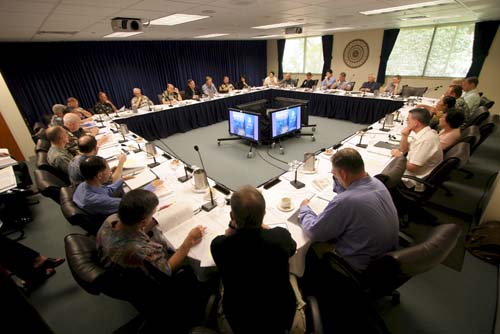
Experts in Biosecurity attend the “Biosecurity Threats in the Asia-Pacific Region” conference co-hosted by the Asia-Pacific Center for Security Studies and the Center of Excellence in Disaster Management & Humanitarian Assistance. The conference was held Aug. 8-11 at APCSS.
HONOLULU – Biosecurity experts came together in Hawai‘i this week to look at ways to enhance national and regional understanding of biological threats and strategies to prevent and respond to biological incidents.
The “Biosecurity Threats in the Asia-Pacific Region” conference focused on sharing information and ideas. Participants shared their diverse expertise in hopes of developing approaches to strengthen capacity building and influence policy-makers to effectively deal with both natural and man-made biological threats.
More than 35 civilian and military experts in this field attended the conference that was co-hosted by the Asia-Pacific Center for Security Studies and the Center of Excellence in Disaster Management & Humanitarian Assistance. Attendees included distinguished health professionals from the World Health Organization, U.S. Pacific Command, Centers for Disease Control and Prevention, National Institute of Health (U.S.), U.S. Health and Human Services, National Institute of Allergy and Infectious Diseases (U.S.), National Institute of Hygiene and Epidemiology (Vietnam), Hong Kong Hospital Authority, National Defense University (U.S.), Hawai‘i State Department of Health, University of Hawai‘i-M?noa, University of California at Davis (animal health), U.S. Army Medical Research and Materiel Command, Singapore Armed Forces Medical Corps and others.
The diverse group that attended this conference is an example of how “Biosecurity is an ‘all’ agency problem, not just a Defense problem. It is a team effort in every country,” said Dr. Jim Lackey, executive director of the Asia-Pacific Center for Security Studies.
Experts shared lessons learned in past biosecurity threats including the SARS and flu outbreaks and Weapons of Mass Destruction. “The enormous complexity of health security has been evident in our discussions; and it is health practitioners like these that will help all civil and military institutions address the challenges we all face,” noted Pete Bradford, Director of the Center of Excellence in Disaster Management & Humanitarian Assistance.
The medical professionals noted that biosecurity threats cut across multiple sectors, including the economy. “The example of bird flu in Asia highlighted the economic and human health impacts from uncontrolled animal diseases”, commented Dr. Sharon Hietala, an expert in animal health in the California Animal Health and Food Service Laboratory System, at the University of California , Davis .
Participants applauded the multi-sectoral civil and military collaboration that the conference fostered. All agreed that this conference was a first step to begin building communications to deal with a potential pandemic outbreak in the Asia-Pacific Region. Dr. Hietala highlighted the outcome of the conference: “With this meeting, we’ve seen an exciting vision of global veterinary and public health, with civilian and military interests closely aligned to respond and ultimately prevent similar threats… It’s exciting that from this meeting, we have a vision from which we can start working.”






Leave A Comment